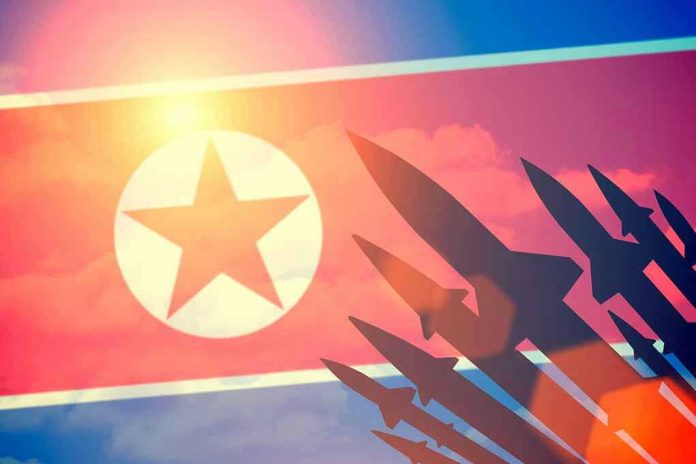
North Korea’s demand that the US accept its nuclear arsenal as a precondition for diplomacy puts American security and global stability at risk, sparking renewed debate over how far the Trump administration should go in engaging rogue regimes.
Story Snapshot
- Kim Jong Un signals willingness to resume talks with Trump only if the U.S. drops denuclearization demands.
- Trump administration prepares for possible direct engagement, reviving a personal diplomacy approach that defies Washington’s traditional strategy.
- Experts warn that accepting North Korea’s nuclear status could undermine decades of non-proliferation efforts and embolden adversaries.
- Regional security and U.S. alliances may be reshaped by any shift in policy, with allies concerned about American resolve and deterrence.
Kim’s Conditional Openness: Nuclear Arsenal as Bargaining Chip
In September 2025, North Korean leader Kim Jong Un publicly stated he has “fond memories” of former President Trump and is open to renewed talks—on the strict condition that the United States abandons its long-standing demand for North Korean denuclearization. This demand marks a sharp departure from previous diplomatic frameworks, as Kim insists that North Korea’s nuclear arsenal is non-negotiable. His statement, delivered in a high-profile parliamentary speech, positions nuclear weapons as central to regime security and any potential deal with the United States.
Kim’s approach leverages years of nuclear and missile development, coupled with deepening ties to Russia and China, to offset U.S. and international pressure. Trump’s presidency previously featured an unprecedented three summits with Kim, but each collapsed over this same impasse: North Korea’s refusal to surrender its nuclear deterrent. Despite sanctions and military standoffs, Pyongyang’s position has hardened—now demanding formal recognition of its arsenal as a precondition, rather than a negotiating outcome. This shift tests the resolve of Washington and its allies, especially as Trump’s administration signals openness to a new round of high-stakes diplomacy.
Trump’s Diplomatic Calculus and Institutional Constraints
President Trump’s willingness to engage directly with Kim reflects his belief in personal diplomacy and unconventional negotiation tactics. After returning to office in 2024, Trump has reiterated his intention to pursue dialogue, referencing the “fond memories” both leaders claim from their past summits. However, this approach faces skepticism within the U.S. national security establishment, which remains wary of legitimizing North Korea’s nuclear status. The State Department and Defense Department are tasked with balancing Trump’s engagement strategy against longstanding U.S. commitments to denuclearization and regional alliances, particularly with South Korea and Japan.
Unlike the Biden administration’s cautious, multilateral posture, Trump’s team appears more open to direct leader-to-leader talks. Yet, no formal negotiations have begun, and both sides are publicly testing each other’s willingness to compromise. The U.S.-South Korea alliance, though strong, faces new strains as Seoul worries about the implications of any American policy shift. Meanwhile, Pyongyang seeks maximum leverage, demanding security guarantees and sanctions relief in exchange for little substantive change in its nuclear posture.
Strategic Risks: Non-Proliferation, Alliances, and U.S. Values
Accepting North Korea’s nuclear status would represent a dramatic break from decades of American policy and global non-proliferation norms. Experts warn this would set a dangerous precedent, signaling to other adversaries that nuclear brinkmanship pays off. U.S. allies in the region, particularly South Korea and Japan, are closely monitoring Washington’s moves, fearing that American willingness to compromise could erode their own security guarantees and destabilize the balance of power in East Asia. Such a shift also raises questions about the credibility of U.S. deterrence and the future of international arms control efforts.
North Korean leader Kim Jong Un said in a speech to the country's Supreme People's Assembly that he has "fond memories" of US President Donald Trump and is open to future talks with the United States — if he can keep his nuclear arsenal ➡️ https://t.co/AdtvLjinbl pic.twitter.com/wU5zy9Wi6A
— AFP News Agency (@AFP) September 22, 2025
For conservatives, the prospect of legitimizing a rogue regime’s nuclear arsenal—especially one that systematically violates human rights and threatens American interests—runs counter to core values of national strength, constitutional defense, and principled foreign policy. Any agreement that rewards North Korean intransigence or undermines alliance commitments risks emboldening adversaries elsewhere and weakening America’s standing as a global leader. As the Trump administration weighs its next steps, the stakes for U.S. security, global order, and the enduring struggle against authoritarian threats have rarely been higher.
Sources:
Trump, Kim Jong Un, And The Elusive Promise Of North Korean Denuclearization
North Korea’s Kim open to talks with Trump — if U.S. drops denuclearization demands
Will Kim Jong Un Meet Trump Again?
Kim Jong Un has ‘fond memories’ of Trump and is open to talks with US
North Korea talks: Kim Jong Un, Trump, and the future of nuclear negotiations














